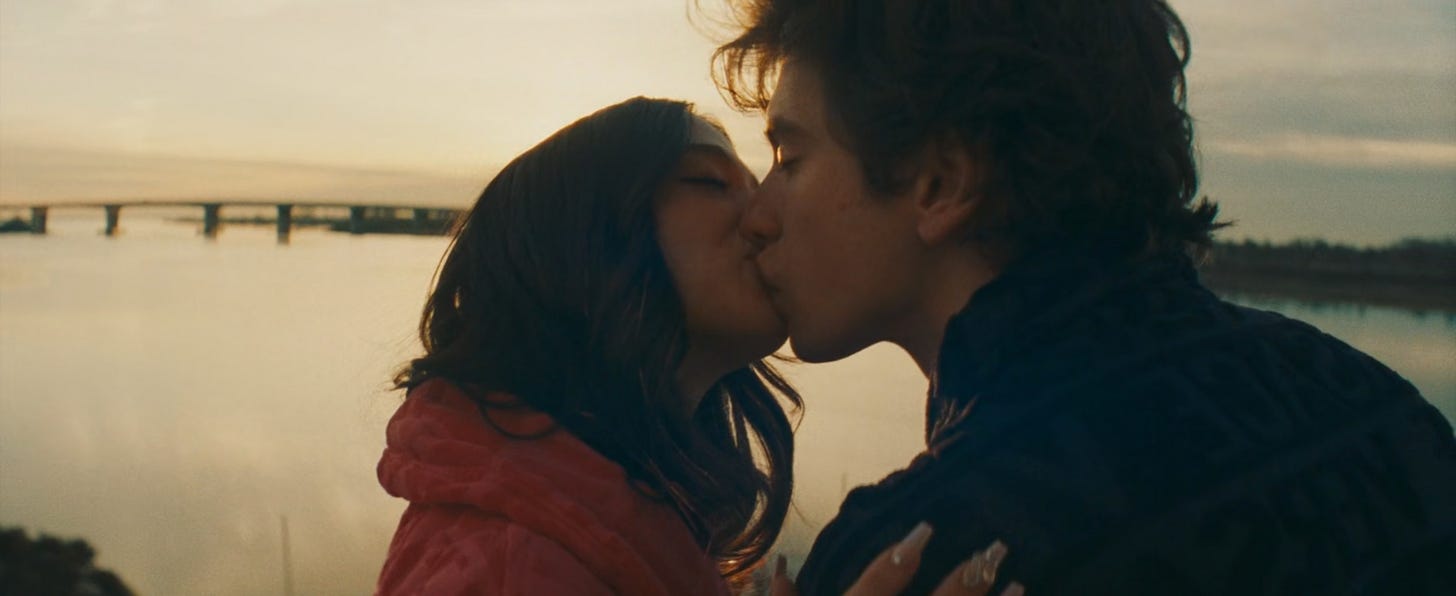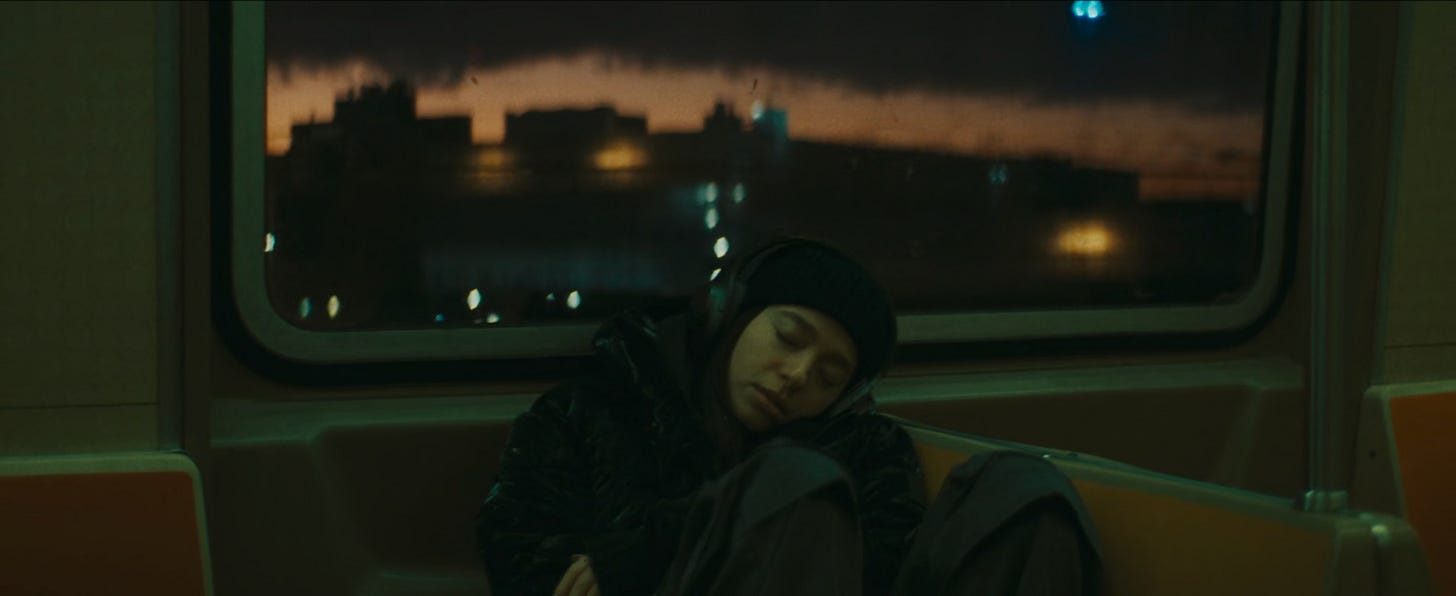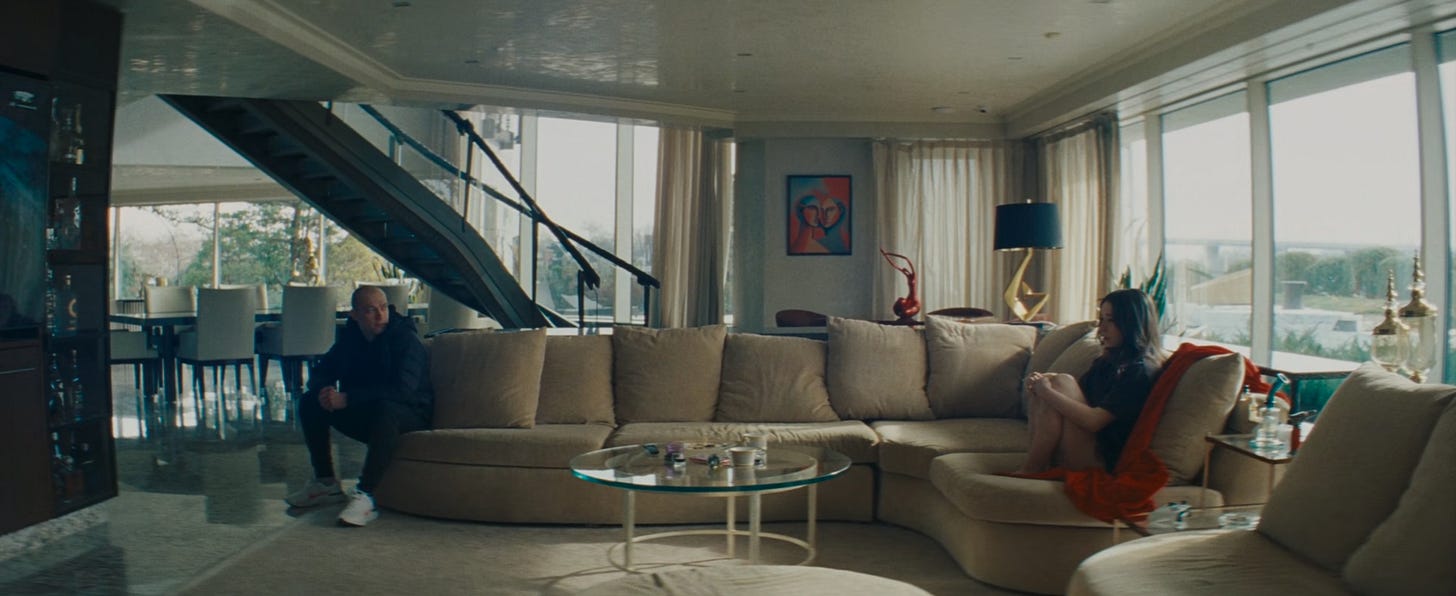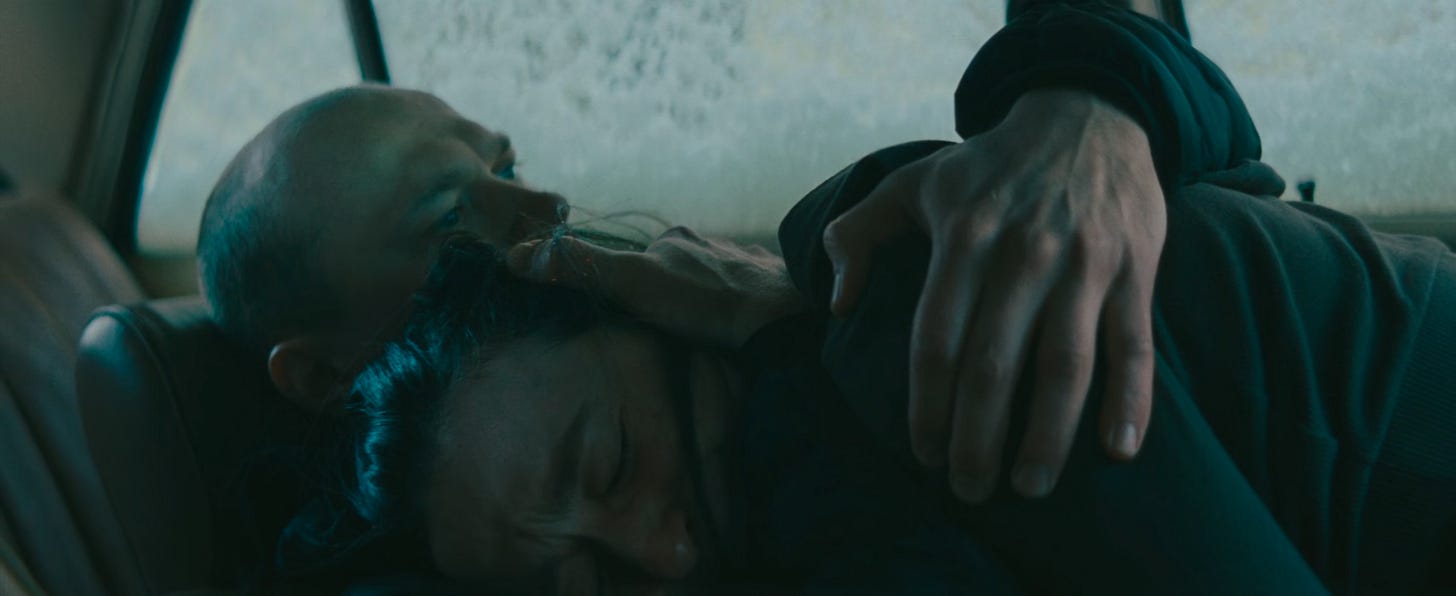Vanya Isn’t Real: “Anora” and the fantasy of life beyond labor
A belated analysis of Sean Baker's acclaimed anti-Cinderella story
I started working on this piece when I first saw Sean Baker’s Anora in early November, but waited to finish and publish it until I could work with and use specific images from the film. Now that it’s out for digital rental – and with my Top 10 Films of 2024 list coming on December 31st – now seemed like the perfect time. Spoilers for Anora are included throughout, as this is less a review than an analysis of the film.
Vanya isn’t real.
Those words kept bouncing around my head through the last hour or so of Sean Baker’s Anora, as I tried to process why this excellent film had thrown me so entirely off balance. The great contradiction of Anora is that while it is one of the most entertaining, intoxicating, and compulsively watchable films of 2024, it is also completely devastating, and at a certain point the ‘entertainment’ and ‘intoxication’ of it all evaporates, leaving us with stress and sadness and a growing awareness that none of this is going to end well. The eponymous Anora – or Ani, brought to life in the year’s best cinematic performance by Mikey Madison – goes from laboring as a dancer and sex worker to believing she’s found a way to leave that labor behind; when Vanya disappears at the first sign of trouble, the act of labor returns in full force – in this case, the physical labor of searching, and the even greater emotional labor of making her voice and personality heard by people who want her to disappear. And as the film transitions from soaring fantasy depicted in kaleidoscopic montage to a single long night of gritty, street-level ‘work,’ slower and greyer and increasingly brittle and caustic, I found myself wondering which movie I had been watching; whether the thing I fell in love with in the first half was being failed by the second, or whether what I was watching was illusory all along.
That is, of course, the exact dilemma Ani herself is engaged in; like many great movies, Anora not only aligns the viewer with the protagonist’s subjectivity, but finds a way to make us feel what she does, using cinema’s potential as a “machine that generates empathy” to mirror her experience in the story with our experience of watching that story unfold. And the damning conclusion both Ani and the viewer must come to is this: Vanya isn’t real. He never even existed.
Anora’s opening act is so convincingly staged and edited and performed that we fall into the same Cinderella trap as Ani herself, believing that this rich spoiled Russian kid might actually give her a better life. There’s a voice in our head telling us that’s probably not true, just as there’s surely a voice inside Ani telling her the same. She is selling Vanya a fantasy, and he’s selling her one of his own; but the fantasy is enrapturing all the same, a spectacular collision of color, excess, chemistry, and sex that feels romantic, even though we know ‘romance’ isn’t something that can be manufactured this quickly. There are so many places where we expect the other shoe to drop, to see the fantasy ruptured, but for a while it simply doesn’t come. Vanya isn’t cruel or abusive; Baker doesn’t even resort to the trope of the boyfriend getting annoyed at the girlfriend interrupting his gaming – Vanya happily sets down the controller for more time with Ani. He doesn’t seem particularly special, but neither does he seem ‘bad’; combined with the money, the big house, and his and Ani’s easygoing chemistry, maybe that’s enough to start believing this pumpkin is actually a carriage.
But of course, the absence of active badness is not the same as the presence of real substance. And there is no substance to Vanya. So much of the film is spent looking for him, retracing the steps he and Ani walked together only to find every space they inhabited is so much more quotidian than we initially understood. And when he is finally found, the revelation – which everyone on both sides of the screen should have always seen coming – is that he never existed at all. This kid is hollow, a creation of unlimited money and unbound excess, spoiled from birth with no expectations or responsibilities. There is no depth, nothing to understand, nothing to push against; perhaps he and Ani got along so well because he lacks any of the friction real people have, the friction that makes negotiating a relationship an act of effort and faith. At the slightest sign of trouble, he has crumbled before us, leaving behind a non-verbal husk that cannot even walk on its own two feet. Whatever we saw before was an illusion: the illusion that a real human being can exist independent of adversity or exertion, of wants more complex than basic bodily demands. Ani keeps trying to hold on to the illusion, even after we – and probably she – have realized there’s nothing there, and that loving this void of a person was like trying to capture smoke with one’s hands.
The real intelligence behind what Baker does here is that, in making us understand how Vanya isn’t real, he also underlines just how real Anora is. It would be easy to tell the opposite version of this story: to make the rich boy our lead, and have him led astray by a sex worker who sells him an unfulfillable fantasy before breaking his heart. Hollywood has told plenty of stories like that before, and it’s the way we are culturally conditioned to see not only sex workers, but women in general (as somehow duplicitous or false – think of the femme fatale archetype in film noir). Anora is, after all, the person literally ‘selling’ something, as a direct transaction, at the film’s outset. But as he has always done across his filmography, Baker sees sex work as work, one piece in the larger chain of capitalist relations in which people buy and sell their goods, services, and bodies. That Anora’s work is sex does not change the fact her work is labor, and it is through the idea of ‘labor’ that Baker, in part, builds empathy between audience and protagonist.
It is the fact that Anora ‘works’ that initially establishes her, to us, as a person of substance. The most important shot in Anora – and this is a magnificently photographed film, arguably the great cinematography achievement of 2024 – comes about 10 minutes in, after we watch Ani go through a night at the club and meet Vanya for the first time. As she finishes punching her number into his phone, Baker hard cuts to Ani sleeping in on the train on her way back home, just as dawn is beginning to break.
I love this shot for many reasons. It is magnificently blocked, for one, with two parallel leading lines (the window, and the raised wall beneath it that Ani is slumped against) emphasizing the horizontality of the frame and the relative emptiness of the train this early in the morning (the soft-focus city skyline and the heavy grey cloud blotting out most of the sunlight double these leading lines at the top of the frame). Ani herself is positioned dead center, bisecting the bottom two lines, her head peeking up just above the window that shows the sun beginning to rise outside – our first bit of natural light in the movie thus far. The tones within the train itself are neutral leaning warm, with beige walls and dark orange seats. It’s a harsh cut, from the interior of the club and its flashing, ever-changing neon lights, to this little glimpse of sunlight and a quotidian drab interior. Ani’s body, too, suddenly transforms, from sparkling with glamor and maintaining an upright, active posture to snoozing in a hoodie, slumped on the train seat with her legs pulled to her chest and her head resting on her shoulder.
The harshness of the cut, and the immediate contrast it creates, leads us to notice these things, and signals to us that she is, in fact, a person – not a product or a persona, but a human being who goes out and does a job and gets exhausted and goes through the sometimes uncomfortable motions of transit to return home and recover from the day (or, in this case, night). There is a quiet but wonderful pathos to this shot, just watching Ani sleep on the train for a few seconds. We’re no longer seeing her playing the specific role she inhabits in the capitalist marketplace, but viewing her at rest, without exertion or pretense. There is no judgment in this: we all have a different switch that flips within us when we are at work, and recognizing that in Ani quickly humanizes her for the viewer.
I cannot imagine Vanya has ever ridden a train, at least not city public transit like this. I cannot imagine he has ever done a hard day’s work, and then collapsed with exhaustion when finally allowed to turn it all off. If there is something ‘uncanny’ to him in us, from his first appearance, it is this: That there is some essential depth missing, the kind of basic human substance we recognize in Ani when she is asleep on that train. An empathetic wall between those of us who have to toil in the cycle of capitalist work and exploitation, and those who are above or removed from it.
To be clear, I do not mean any of this in the conservative sensibility of ‘work is what makes you a good and worthwhile person’ (an attitude which also implies – or directly states – the opposite, that those who do not or cannot work are automatically inferior). It is simply an observation that, in the world we have been born into, most of us must survive by playing a part in the marketplace, by exerting our bodies and minds in service of someone else’s capital, from which we reap a fraction of the rewards. This is why we should empathize with sex workers, not fear or demonize them; they are working too, and if they are being exploited, so are we. That’s just life under capitalism, and there is a shared humanity we should all be able to recognize in one another while trapped in this cycle. The arc of Anora is one of moving away from labor towards illusory escape before returning to labor once more; Ani’s tears flow at the end of the film for many reasons, and one of them is this feeling of inescapability, of acknowledging the inherent tragedy that is living a world where so much of our humanity is ultimately rendered transactional.
The person whose shoulder she cries on, of course, is Igor, because he is the character in the film most like her. The biggest magic trick of Anora, I think, is how it takes this figure we initially dismiss as little more than a background extra – another goon in the line-up of put-upon Russians trying to sort out The Vanya Situation – and gradually illustrates him as the second-most substantive person on screen, behind Ani herself. As Ani and the viewer are aligned in slowly realizing how fundamentally illusory Vanya is, she and we are also adjoined in recognizing a shared depth of humanity with Igor. And as with Ani, that depth is similarly rooted in observing him as someone who labors.
I found myself getting antsy, on my first viewing, at the sheer length of the scene in Vanya’s house after Vanya runs away; it’s a long escalation of shouting matches, slapstick violence, and quiet threat, as Ani tries to fight or at least negotiate with the goons who have invaded her domestic fantasy. On a second viewing, it all snapped into place for me, because I knew this time how important Igor was to the film’s ultimate shape; and as much great work as Mikey Madison does here, Baker’s camera and edit are equally attuned to Yura Borisov’s performance as Igor, quietly cueing us, over and over again, to see how differently he reacts to all this than Toros or Garnick. He’s more bemused, at first, and as a hired hand – not an integral part of the ‘family’ – he’s a lot less personally invested; we see him try to make small talk with Anora, and notice the familiar, rehearsed way he takes a seat or lights a cigarette, like this kind of waiting around is something he’s gotten used to. He too is doing a ‘job,’ and like Anora, the thing he sells is his body – not for sex, but for intimidation and violence. The culmination point of the scene is when he physically restrains her, trying to deescalate the situation with the very limited toolset he knows how to use (which understandably sours Anora towards him for much of the film, as she does not see someone working a job, but threatening her body).
By the end of the film, though, Ani and Igor have been joined in the same kind of labor, sleeplessly searching for an idiot failson throughout this long dark night of the soul. Their last handful of scenes together, starting with their night watching TV and smoking amidst the detritus of Vanya’s manor, are probably my favorite in the film, as both have the space to see – and, haltingly, discuss, largely through jabs – the humanity they see in each other. Igor is the only one low-enough on the economic totem pole to recognize how devastating this entire situation is: what cruelty is being done to Anora by the whims of these rich monsters who cannot even begin to see her as human. Surely he, too, would leap at the chance for a better life like she did, removed from the cycle of labor and exploitation. But the fantasy itself is exploitative, not a pumpkin turned into a carriage, but a rig ripped out from under her feet. The apology Igor risks his job to suggest Vanya offer is the absolute least these people could do; barring that, he can swipe the wedding ring and carry Ani’s luggage back up the snowy steps to her old home. Neither accomplish much, but the gesture says a lot.
There are surely multiple ways to read what comes next, in the film’s extended final shot, but this is what I see: That Ani isn’t sure how to recognize or repay Igor’s small kindness; that she initiates sex as a way to nonverbally show that appreciation, or at least work through her complicated feelings; that Igor’s attempt to kiss her begins to move this exchange from transactional to romantic, a real connection between two people; and that at that moment, it all becomes too much, the weight of everything promised and ripped away felt intensely at the first signal of genuine intimacy; and the tears finally come, because it hurts Anora so much to feel anything after she was so thoroughly punished for feeling the possibility of hope with Vanya. She, like us, was intoxicated by everything that happened in the first 40 minutes of this film; and the price she paid for that brief, ephemeral dream of comfortable domesticity was simply too steep not to stain new experiences of intimacy.
Just as the cut I identified earlier – from Ani in the club to Ani on the train – operates on a stark juxtaposition, the entire film is constructed, on a macro level, upon big structural contrasts, ones that encapsulate the journey the film takes us on and the way its mastery of film language guides us from exuberance to anguish. Anora starts with music, blasting Take That’s “Greatest Day” at full volume, and it ends with no music whatsoever, its entire final scene passing by with only sparse diegetic sound, which continues through closing credits. Anora opens with a flurry of kaleidoscopic montage editing, both in establishing Ani’s routine at the club and in taking us through her honeymoon phase(s) with Vanya, and it ends on a single unbroken shot that lasts for three minutes. Anora begins with vibrant, hyperbolic color – neon blues and reds dancing atop the bodies of Ani and her fellow dancers in the club – and it ends in cold, grey winter, snow blotting out the world as Igor’s windshield wipers fight a Sisyphean battle to let light inside this cheap cramped car. The colors say it all, the distance between the club’s artificial but intoxicating lights and the winter morning’s chilly monochromatism reflecting the harshness of lived reality versus the vibrancy of the fantasies we buy and sell – including the fantasy that we can ever escape the chains of capitalism and remove ourselves from the cycle of infinite transactions that fuel the myth we call the American Dream. The tears Anora sheds, and the hollow feeling of emotional exhaustion we in the audience sit with as the credits play out in silence, are rooted in letting that horrible, uncomfortable truth settle in.
Vanya isn’t real; he was never real. Anora is real – and she is vibrant, and she is strong, and she is resilient. But being all those things doesn’t protect us from disappointment, doesn’t shield us from exploitation, doesn’t make us resistant to the social and economic gravity weighing us down. Eventually, the cold grey morning comes for us all; eventually, our feelings must be felt.
Read the book 200 Reviews by Jonathan R. Lack in Paperback or on Kindle
Subscribe to PURELY ACADEMIC, our monthly variety podcast about movies, video games, TV, and more
Like anime? Listen to the podcast I host with Sean Chapman, JAPANIMATION STATION, where we review all sorts of anime every week. Watch on YouTube or Subscribe wherever you get your podcasts.








Loved this review